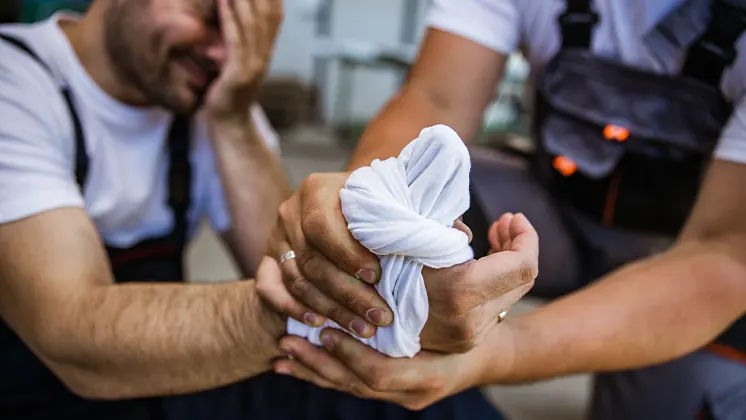I Cut Myself at Work – Am I Eligible for Worker Compensation Benefits in Virginia?

Sustaining a cut injury at work can be a scary and stressful situation. In addition to managing the physical pain and taking time off to heal, you may be worried about lost wages and medical bills piling up.
The good news is that if your injury occurred on the job in Virginia, you may be eligible for workers’ compensation benefits to help cover these costs. At Slominski Law, we have over 30 years of experience helping injured workers get the compensation they deserve under Virginia law.
In this general guide, we discuss the step-by-step process for filing a workers’ comp claim after accidentally cutting yourself at work. We will also overview key benefits you may be entitled to and answer some frequently asked questions. Please consult us at Slominski Law for more specific advice on your situation.
Am I Eligible to File a Workers’ Compensation Claim for My Cut or Laceration?
The short answer is that it is possible to claim workers’ comp for a cut, laceration, or puncture wound. In Virginia, most employees who suffer job-related injuries or illnesses are covered under the workers’ compensation system. But determining eligibility in your specific situation requires looking at several factors, such as:
- Employment Classification: Most full-time, part-time, seasonal, and temporary employees are covered. Independent contractors typically do not qualify.
- Type and Cause of Injury: The injury must have occurred in the course of and arising out of the scope of employment. For cuts, this usually means handling materials, equipment, or tools as part of your work when the injury happened. A cut may also be compensable if it occurred during and because of a work activity that exposed you to sharp objects.
- Timeliness: To receive benefits, you must notify your employer within 30 days of the cut happening. Reporting immediately is best.
- Pre-Existing Conditions: Even with a pre-existing health issue, if your employment activities substantially aggravated or worsened your condition, you may still qualify.
The experienced team at Slominski Law can evaluate the unique details of your on-the-job cut and advise if you meet the eligibility criteria for workers’ compensation benefits in Virginia.
What to Do Immediately After Cutting Yourself at Work
If you suffer a laceration, puncture wound, or any other type of cut while performing job duties, taking quick action is important for your health and your potential claim. Here are the first steps you should take:
- Seek Medical Attention: Even if the cut does not seem overly deep or serious, it is crucial that you receive prompt medical care. This will allow a doctor to assess the wound, provide treatment, and properly document details related to your injury.
- Report the Injury: Notify your supervisor right away that you sustained a workplace cut. Virginia law requires injuries to be reported within 30 days, but it is best to report as soon as possible after the incident.
- Gather Details: Write down specifics like what you were doing when cut, any safety equipment in use, witnesses present, and actions taken post-injury. This information will assist your claim.
Taking these vital first steps lays the groundwork for filing your workers’ compensation claim and connecting your cut directly to your work activities.
How Do I File a Claim After a Cutting Injury at Work?
Filing a successful workers’ comp claim involves following some important steps and deadlines. Here is an overview of the process:
- Report to Your Employer: Inform your supervisor or employer about your workplace cut injury as soon as possible. Submit any accident reports or injury paperwork they require as well. Make sure to have everything in writing.
- Get Medical Treatment: See a doctor promptly, preferably one who specializes in occupational injuries and accepts workers’ compensation patients. The physician can treat your wound, determine work restrictions or disability status, and complete critical paperwork.
- Notify Your Employer of Claim: Even after reporting the initial injury, you must still formally notify your employer that you plan to file a workers’ compensation claim. You may do this within 30 days of the accident date, but it’s important to give notice as soon as you can to show the genuineness of your claim.
- File the Claim: Complete and file the Claim Form along with accident reports and medical records to the Virginia Workers’ Compensation Commission within two years. We can file on your behalf.
- Attending Hearings: You may have to attend mediation appointments, case conferences, or hearings where both sides present evidence. We can represent your interests at these events.
Without legal guidance, these various steps can become confusing. At Slominski Law, Attorney Jaleh Slominski can handle all aspects of filing your claim after your workplace cut so you can focus on your recovery.
What Workers’ Compensation Benefits Can I Receive for My Cut Injury?
If your workers’ comp claim is accepted, these are some of the benefits our Virginia work injury law firm may be able to help you obtain:
- Medical Care: Paid treatment from doctors, specialists, hospitals, surgery centers, and prescription medications to help you recover from the effects of your laceration or puncture wound.
- Temporary Disability: Wage replacement checks equal to 66 2/3% of your average weekly pay if you must miss five or more days of work while recovering.
- Permanent Disability: Potential lump sum payout if your injury causes lasting damage and permanent work restrictions. The amount depends on severity.
- Rehabilitation: Job placement services, retraining in a new occupation, workplace or equipment modifications if you cannot return to prior position.
- Mileage Reimbursement: Compensation for travel to attend medical appointments and claim-related meetings and hearings.
- Death Benefits: Payments covering funeral costs plus wage replacement for dependents if a fatality resulted from the workplace cut.
Our skilled worker’s comp lawyer at Slominski Law will determine which of these workers’ comp benefits apply in your specific situation after accidentally cutting yourself on the job. We help maximize your compensation under the law.
Will I Have to Pay Taxes on My Workers’ Comp Settlement?
Unlike personal injury settlements, workers’ compensation benefits are not taxable at the federal level. In Virginia, workers’ comp benefits generally remain federal and state tax-free, allowing injured employees to keep 100% of their awarded compensation. A common exception, however, is if the employee also receives Social Security Disability benefits. Consult with us for free at Slominski Law to get tailored legal advice.
Can I File a Third-Party Liability Lawsuit After Receiving Workers’ Comp?
Yes, it may be possible to recover additional damages above your comp benefits by filing a personal injury lawsuit against a negligent third party. Examples of third parties in the workplace are vendors, contractors, subcontractors, or manufacturers who are not your employer.
For instance, if a subcontractor caused your workplace laceration after they provided a dangerous product or created unsafe conditions, we can explore your right to sue them.
What If My Employer Denies My Workers’ Comp Claim After My Workplace Cut?
Even with a clearly job-related laceration, some employers still wrongfully deny claims. If this happens, do not panic. Slominski Law can immediately initiate an appeal on your behalf. We relentlessly pursue rightful benefits through all necessary steps under Virginia’s workers’ compensation system, including hearings, mediation, and settlement negotiations. With our fierce and compassionate counsel, you can stand up to employer denial.
Frequently Asked Questions About Cuts and Lacerations at Work in Virginia
If you suffered a workplace laceration, stab wound, or other puncture and have more questions about Virginia workers’ compensation law, our experienced personal injury attorney Jaleh Slominski has answers.
Do I have to report my injury to my boss before seeking medical treatment?
No, you should go to an emergency room or doctor’s office promptly to have your wound evaluated first before notifying a supervisor. Just be sure to report the details as soon as you can.
What if I cut myself because I wasn’t following safety protocols?
Even if you were not using protective equipment, violated a policy, or acted negligently, you can still receive benefits. Workers’ compensation in Virginia covers all job-related cuts regardless of fault.
Can my employer fire me after I report my laceration injury?
No, it is illegal for employers to retaliate against someone for filing a workers’ comp claim. If they threaten or dismiss you, contact Slominski Law immediately.
How much income will I get paid weekly if I’m off work because of my cut?
In Virginia, your wage-loss benefits depend on the type of disability that results from your injury. If your workplace laceration is a temporary partial disability, your potential weekly benefit is 66.66 percent of the difference between your average weekly wages and your current light-duty wages.
If it is a permanent partial disability – for example, you severely lacerated a finger and lost your use of it – you can receive 66 2/3% of your pre-injury average weekly wages while recovering. There are set minimum and maximum benefit rates each year.
What if symptoms from my cut do not appear until after I leave my job?
Even if you notice pain, infection, or functional problems days or weeks later, promptly report your condition as work-related, seek medical confirmation, and file a claim. Strict deadlines apply, however, so don’t delay in consulting a workers’ comp attorney.
For answers regarding the intricacies of your specific cut injury comp claim, count on the knowledge and experience of Jaleh Slominski at Slominski Law. Call (434) 384-9400 (Lynchburg office) or (540) 554-3762 (Roanoke office) for your free consultation.
Protecting the Rights of Injured Workers in Lynchburg and Beyond
At Slominski Law, assisting injured employees is personal for workers’ compensation attorney Jaleh Slominski and her dedicated staff. Our law firm understands you may be facing physical pain, emotional stress, and financial uncertainty after cutting yourself in a workplace accident. That is why our top priority is securing the maximum compensation benefits and legal protections allowed under the Virginia Workers’ Compensation Act.
Unlike large law firms, Slominski Law provides personalized attention, respectful counsel, and insight gained from over 30 years exclusively representing injury victims in Virginia communities. We handle the entirety of the claims process for you so you can stay focused on your recovery.
Whether your injury occurred in Lynchburg, Roanoke, Farmville, Bedford County, or anywhere throughout the state, we at Slominski Law stand ready to fight for your rights to benefits. For a free, no-obligation consultation about your workplace cut injury, call (434) 384-9400 (Lynchburg office) or (540) 554-3762 (Roanoke office) or contact us online today.





